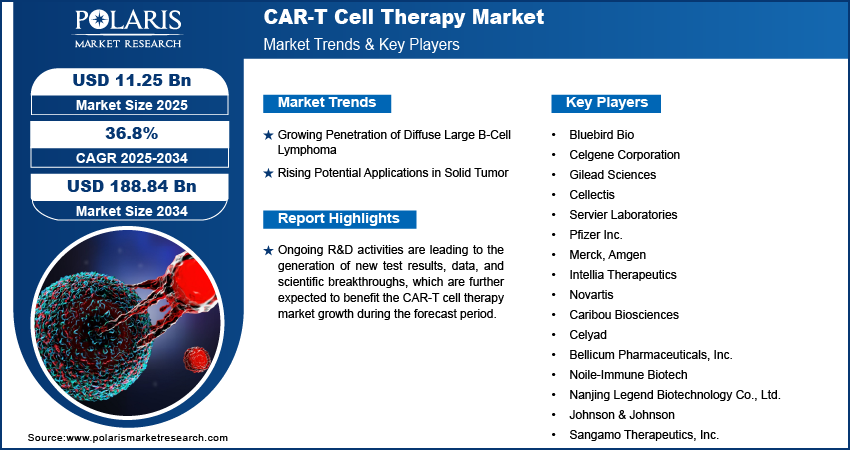The global CAR-T cell therapy market size is expected to reach USD 188.84 billion by 2034, exhibiting a CAGR of 36.8% during 2025–2034.
Chimeric Antigen Receptor T-cell (CAR T) Therapy represents one of the most revolutionary advancements in cancer treatment. This form of immunotherapy uses genetically engineered T cells to recognize and attack cancer cells. CAR T-cell therapy has demonstrated significant clinical success, particularly in hematological cancers like leukemia and lymphoma, where it has provided substantial progress in previously hard-to-treat cases.
Market Growth Drivers
- Rising Incidence of Cancer
- Cancer rates are rising globally, particularly in hematologic malignancies such as leukemia, lymphoma, and myeloma. CAR T-cell therapy has shown remarkable promise in treating these cancers, driving demand for novel, effective treatments.
- Efficacy of CAR T-Cell Therapies
- CAR T-cell therapies have demonstrated superior efficacy in certain cancers, particularly in blood cancers. The remarkable clinical success of therapies like Kymriah (tisagenlecleucel) and Yescarta (axicabtagene ciloleucel) has encouraged greater acceptance and adoption in clinical settings.
- FDA Approvals and Expanded Indications
- The approval of CAR T-cell therapies by regulatory bodies such as the FDA for various types of cancers has accelerated market growth. New indications for previously approved CAR T-cell therapies are expanding, including treatments for solid tumors, which could open up vast new market opportunities.
Key Companies in CAR-T Cell Therapy Market
- Bluebird Bio
- Celgene Corporation
- Gilead Sciences
- Cellectis
- Servier Laboratories
- Pfizer Inc.
- Merck
- Amgen
- Intellia Therapeutics
- Novartis
Download Free Sample PDF Copy of the Report:
https://www.polarismarketresearch.com/industry-analysis/car-t-cell-therapy-market/request-for-sample
Key Trends in the CAR T-Cell Therapy Market
- Expanding Applications Beyond Hematological Cancers
- Initially focused on hematological cancers, CAR T-cell therapies are now being investigated for solid tumors, including breast, lung, and pancreatic cancers. The successful expansion of CAR T-cell therapy into solid tumors would significantly broaden the market scope.
- Next-Generation CAR T-Cell Therapies
- Research into next-generation CAR T-cell therapies is underway, focusing on improving durability, reducing side effects, and enhancing efficacy. Innovations such as dual-targeted CAR T cells, allogeneic (off-the-shelf) CAR T-cell therapies, and combinatory approaches with checkpoint inhibitors are expected to transform the market landscape.
- Manufacturing and Cost Challenges
- One of the key challenges in the CAR T-cell therapy market is the complexity and high cost of manufacturing. The process involves harvesting T cells from the patient, genetically modifying them, and reinfusing them. Efforts are underway to streamline manufacturing processes and reduce production costs, which could make these therapies more accessible to a broader patient population.
AR-T Cell Therapy Market Developments
December 2021: Novartis, a medicines company that discovers, develops, and manufactures treatments to improve people’s lives, announced the introduction of T-Charge. T-Charge is the company’s next-generation CAR-T platform that will serve as the foundation for various new investigational CAR-T cell therapies in the Novartis pipeline.
January 2022: Intellia Therapeutics and Kyverna Therapeutics announced a collaboration to develop next-generation allogeneic T-cell therapy for autoimmune diseases.
October 2020: Merck KGaA, a science and technology company, increases its stake in CAR-T therapies developer Precigen. This helped Precigen to regain full autonomous development of its proprietary CAR-T technology platform.
𝐒𝐞𝐠𝐦𝐞𝐧𝐭𝐚𝐥 𝐀𝐧𝐚𝐥𝐲𝐬𝐢𝐬:
The research study includes segmental analysis that divides the market into distinct groups or segments based on common characteristics. With market segmentation, businesses can identify specific customer groups that are more likely to be interested in specific products or services. Also, it enables these businesses to focus their marketing efforts and resources more efficiently, leading to higher conversion rates and improved return on investment. Furthermore, segmentation analysis helps companies develop personalized products or services, which can result in increased customer loyalty and improved customer satisfaction.
By Indication Outlook (Revenue, USD Billion, 2020–2034)
- DLBCL (Diffuse large B-cell lymphoma)
- ALL (Acute Lymphoblastic Leukemia)
- CLL (Chronic Lymphocytic Leukemia)
- MM (Multiple Myeloma)
- FL (Follicular Lymphoma)
- Mastozytosis
- Myeloid Fibrosis
- MLL (Mixed Lineage Leukemia)
- Thymic Cancer
- Glioblastoma
- AML (Acute Myeloid Leukemia)
- Other
By Target Antigen Outlook (Revenue, USD Billion, 2020–2034)
- CD19/CD22
- BCMA (B-Cell Maturation Antigen)
- Others
The CAR T-cell therapy market holds immense potential due to its groundbreaking success in treating hematological cancers and ongoing research into expanding its applications to solid tumors. As the market grows, technological advancements, regulatory approvals, and strategic partnerships will drive innovation and improve patient access to these therapies. However, challenges related to cost, manufacturing complexity, and side effects need to be addressed to unlock the full potential of CAR T-cell therapy in oncology.

